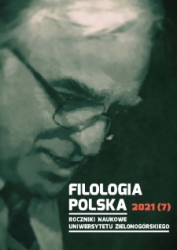On a contemporary poet’s output from the Baroque perspective
Keywords
Abstract
Stanisław Gostkowski, a contemporary poet, author of seven volumes, died in 2000. He did not belong to the New Wave and New Privacy. His literary patron was Tymoteusz Karpowicz. I am writing about the first volume, Don’t bury me alive, and the fourth one, titled Death has a sweet smell. Gostkowski wrote about death, nevertheless just for life. He often emphasises vanitas in his poetry. Here is an interpretation of his output from the Baroque perspective.
References
Dalecki Z., „Kierunki” 1973, nr 41.
[Google Scholar]
Gostkowski S., Ja, król betonów, Alkoholik, „Autograf” 1995, nr 3; „Metafora” 1996, nr 25-26.
[Google Scholar]
Gostkowski S., nie chowajcie mnie żyjącego, Gdańsk 1974.
[Google Scholar]
Gostkowski S., Poświęcenie uczciwości, „Nowy Wyraz” 1973, nr 8, suplement.
[Google Scholar]
Gostkowski S., Razem, Wrocław 1974 (wyd. Klub Młodzieży Pracującej Piwnica Świdnicka; wstęp B. Kierc i M. Garbala).
[Google Scholar]
Hernas C., Barok, Warszawa 1972.
[Google Scholar]
Hernas C., Zarys rozwoju literatury barokowej, [w:] Polska XVII wieku. Państwo, społeczeństwo, kultura, red. J. Tazbir, Warszawa 1969.
[Google Scholar]
Jan Andrzej Morsztyn (Morstin), „Wybór poezji”, oprac. W. Weintraub, Wrocław 1988, BN I, nr 257.
[Google Scholar]
Król „betonów”. Poezje wybrane z aneksem korespondencji, przygotował do druku, oprac. i opatrzył komentarzami P. Smoliński, Warszawa 2020 (wyd. Anagram).
[Google Scholar]
Linkner T., Barokowość poezji Stanisława Gostkowskiego, „punkt. Almanach Gdańskich Środowisk Twórczych” 1978, nr 1.
[Google Scholar]
Maj B., W zenicie bólu, „Nowy Wyraz” 1980, nr 4.
[Google Scholar]
Matuszewski R., O poezji 1974: refleksje osobiste, „Odra” 1976, nr 1.
[Google Scholar]
Morsztyn H., „Światowa rozkosz”, wyd. A. Karpiński, Warszawa 1995 (Biblioteka Pisarzy Staropolskich, IBL, t. 1).
[Google Scholar]
Nagórska A., Sanktuarium rozpaczliwe, „Twórczość” 1999, nr 6.
[Google Scholar]
Nyczek T., Zbędny, umarły, żyję jeszcze, „Miesięcznik Literacki” 1979, nr 7.
[Google Scholar]
Sarbiewski M.K., Wykłady poetyki, przeł. S. Skimina, Wrocław 1958 (BPP B 5).
[Google Scholar]
Waśkiewicz A.K., Posłowie, [w:] S. Gostkowski, Z każdym dniem narasta lęk. Wiersze ostatnie, Gdańsk 2008.
[Google Scholar]
Preview
Downloads
Published
How to Cite
Issue
Section
Categories
Copyright & License

This work is licensed under a Creative Commons Attribution-NonCommercial-NoDerivatives 4.0 International License.
Copyrights (a). In principle, authors who are not employed by the University of Zielona Góra retain the copyright, including publishing rights to the articles, without restrictions.
Copyrights (b). In principle, authors who are employed by the University of Zielona Góra, do not retain the copyright, including publishing rights to the articles. In such cases the copyright holder is the University of Zielona Góra.
Print ISSN
2450-3584-
Abstract1258










































